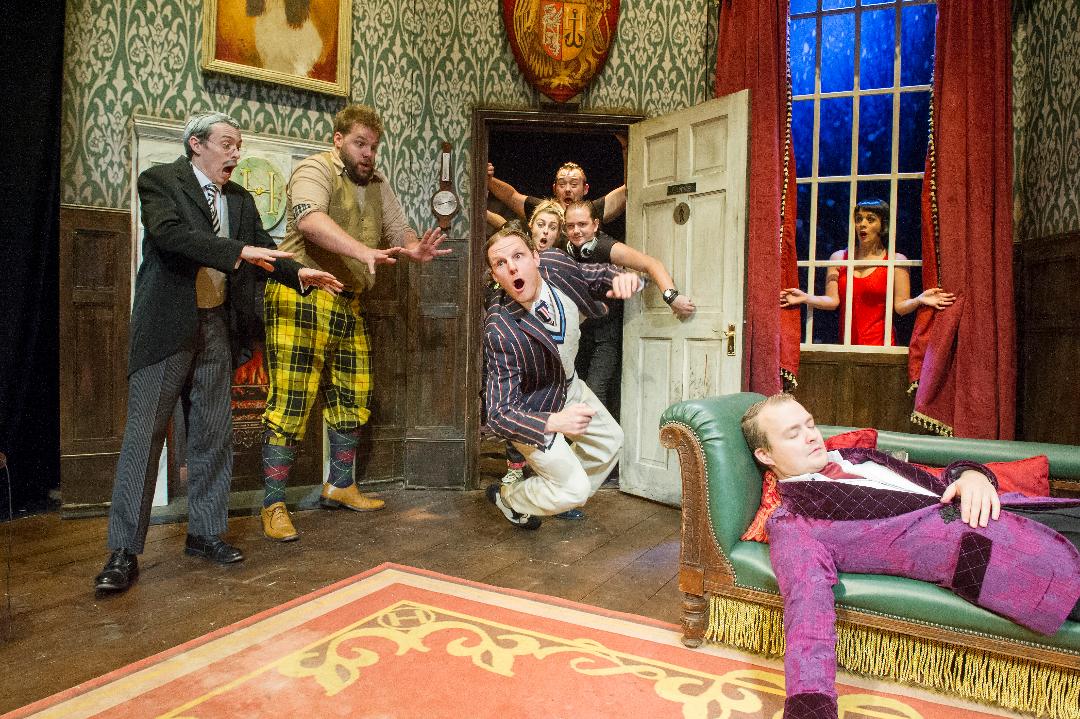"This is theatre with its underwear around its ankles"
Every now and then, some bright spark re-invents the wheel. And when a wheel starts to roll, it creates a groove.
Innovation is a bit of a slippery eel at times, isn’t it? The more you try to pin down something exciting, bold and brilliant – something which has never been done before – the more the devilish little rascal seems to slither through your fingers. Ideas which seem fresh and bold at first light quickly fade as the realisation sets in that the excitement isn’t shared, the potential is limited, and worst of all… everything has already been done before. There is nothing new under the sun.
But perhaps there doesn’t need to be. After all, new doesn’t always equate to good, and if something has never been done before then there might be a good reason for that. If familiarity breeds contempt then unfamiliarity might be said to breed distrust. What is needed then is a new old: an old dog with some new tricks perhaps.
Because the old dog sells. Want to refine your elevator pitch to a movie mogul? Give him the fresh idea in familiar terms he can relate to: ‘It’s like Sleepless In Seattle meets Mad Max…’ or ‘Captain Jack Sparrow, with the voice of Judy Garland, set in the world of Al Capone…’
That’s why the earnest search for the next exciting ‘wheel’ is followed closely by those who know how to identify a trend. In the early days of the internet, for example, dot.com companies were the band wagons that canny entrepreneurs were swift to jump on to. People who recognised the business potential in those early days were able to cash in on the financial boom.
The London Fringe is a seething melting pot of creativity and potential all jostling to be noticed. With so much competition for audiences’ attention, it is a smart producer who identifies the current trends in popular theatre – theatre that actually sells – and discovers a niche within that trend.
So what is the current groove? With an industry as eclectic as the arts there are doubtless more than a few common veins to be found; but one in particular stands out: a perversely self-disrupting form of meta-theatre.
Meta-theatre is concerned with the elements of a play that highlight its dramatic nature, or shine a light on the circumstances of its performance.
The latest groove is a subversive form of transparency, a sort of ‘pants down’ theatre. Practitioners of this new groove are engaging in defiant acts of daredevil self-sabotage to undermine the very essence of their art. They are dropping the veil, ruining the magic, resuming disbelief.
Illusionist Darren Brown is perhaps an example of this trend. He has made a career off the back of seeming to tell the audience how his illusions work (whilst still managing to bamboozle them). Celebrities whose private lives used to retain an air of mystery are inviting camera crews to film prime-time docu-series recording their most intimate moments, while in the West End, Broadway, and now on the BBC, a company called Mischief Theatre, who cut their teeth in the Old Red Lion Theatre, Islington, are creating a small theatrical empire on the back of the premise that seeing the play go wrong is far more interesting than when it goes right.
To a degree, all theatre must necessarily sabotage itself, so as to create the space for disruption and offer its character the opportunity to find solutions. A cosy dinner party must be ruined by an inconvenient murder, a pair of twins must be separated and mistaken for each other or perhaps a hard-working family man must transform into a giant insect; for example. But this new vogue of error plays places the risk outside of the internal narrative, intentionally exposing or even creating a genuine weak spot for the performers to wrestle with. Continued below >
The Play That Goes Wrong - Mischief Comedy use the premise that seeing the play go wrong is far more interesting than when it goes right.
Photographer - Alastair Muir
This is theatre with its underwear around its ankles; revelling in the excruciating agony of performers whose inadequacies lay exposed with no place to hide. The mathematical equivalent might be attempting to gain extra marks for showing your workings, whilst revealing that they are written in crayon on the back of a beer mat. A clever device of The Play That Goes Wrong, and its spin-off versions in Christmas play, television drama and magic shows, is to peer through the fourth wall without really breaking it. Excepting for some audience participation before the show begins and a brief introduction from the director, the company endeavours to keep up the pretence that they are characters in a play, and yet everybody in the room is acutely aware that they are actors attempting, and failing miserably, to put on a play. To acknowledge the audience without acknowledging that you are acknowledging them is quite a feat.
For Mischief, telling the story of the people trying to tell the story has been a winning formula, and you don’t need to look far to find other companies that are also riffing on the idea that something could be intentionally so bad that it becomes good.
It’s a wheel which has been spun before, of course. There are shades perhaps of Michael Frayn’s 1984 play Noises off; a play in three acts, where each act is a repeat of Act One. The first: a technical run through; the second: a backstage view of the first matinee performance; and finally a performance from late into the ten-week run, where bitter in-fighting leads to a breakdown of the script and runs away into frantic ad-libbing. The Play That Goes Wrong revisits this idea, putting their spin on the wheel by condensing the concept into a single performance from the fictitious Cornley Polytechnic Drama Society. Stretching the mantra that the show must go on to the limits, they imagine as many possible ways, increasing to the absolute extreme, in which things in a play might go horribly awry. Continued below >
Top of page and above: Shit Faced Shakespeare produced by Bastard Productions Ltd - They choose one cast member each night to become hopelessly drunk before the show begins, allowing the ensuing chaos to occur organically as a result of their single act of self-sabotage.
Shit-faced Shakespeare
is another company who have happened upon a winning formula for successful failure. Their Shakespearean shake-up, which took the Edinburgh Fringe by storm, chooses one cast member each night to become hopelessly drunk before the show begins, allowing the ensuing chaos to occur organically as a result of their single act of self-sabotage. Thus the bard himself is forced to play second fiddle to the slings and arrows of some outrageous misfortune. And in The Importance of Being…Earnest? the quirkily named Say It Again, Sorry?
Theatre Company has chosen to swap out key actors in favour of enthusiastic audience members. As more and more actors disappear, extra replacements must be drafted in, until in the final instance, the entire cast has been replaced by their own patrons. Continued below >
The Importance of Being Earnest - Say It Again, Sorry? Theatre Company - They swap out key actors in favour of enthusiastic audience members until the entire cast has been replaced by patrons
While these shenanigans wreak havoc on the idea of a well-crafted and stylish production, they create endless moments for the skilled actors to shine as they handle the increasing oddities on stage. It is the occasions of brilliance, when actors succeed or fail in spectacular fashion, which bring delighted cheers and howls of laughter from enthralled punters.
Not surprising then that London fringe productions are also finding the groove. A prime example returning soon to the Lion and Unicorn
is Sam Rix
and Tim McNiven’s one-man show, Jim Clapp's Magnum Opus. In the play, an extravagant and expensive production has been planned, but thanks to a self-destructive spanner in the works from the creators, the set has burned down en route, the live animals are scattered around the M4 and the cast have all bailed out. The consequence of this is that Jim Clapp greets his audience alone and on a bare stage, and attempts to deliver his show-stopping production devoid of all the planned whistles and bells. It is a play about a play that goes wrong, in which the attempt to stage the show is in itself the show.
The magic formula which works for productions like these is easy to spot: identify an established form of theatre and add an additional element, not to the play itself, but to the production of the play. It’s a subtle (or sometimes not so subtle) breaking of the fourth wall, even while the actors might strain to maintain the pretence, and the audience are very much in on the joke. A simple trend to replicate, you might suppose, but it is one thing to recognise the key elements; quite another to find a suitable and untapped niché to exploit for your own innovation.
There is another additional element too, and it is one that is very compelling for an audience: danger. Adding a high potential for the endeavour to fail raises the stakes dramatically and ensures that the tension remains palpable, and unpredictable.
Of course, this form may not be compatible with all theatrical aspirations. Inevitably the adding of a twist to the fundamental format of the play can create a distraction from the actual content of the play. It’s difficult to maintain an interest in the twisting plot of a crime thriller when you are on the edge of your seats waiting to see if the detective will be forced to drink from the bottle of white spirits for the fourth or fifth time in a desperate bid to save face and keep the endeavour going. The modern comedy of errors is often an exercise in style over content, in entertainment over education, in laughter for laughter’s sake.
And yet, this trend is not limited only to comedy, or to triviality. The Improvised Play Company
ably demonstrated this in their recent production, The Glass Imaginary, performed in February at the Drayton Arms Theatre. Using their off-the-cuff style of performance, they entered the groove by adopting the classic style of Tennessee Williams and then promptly stripping themselves of any of her actual lines and plots and replacing them entirely with their own creative concoctions. Whilst the play is delivered straight, the fourth wall is implicitly broken by the shared knowledge that the actors are flying by the seat of their pants, and that at any moment the whole improvised endeavour could come to a crashing halt. The fact that it doesn’t – and that they are able to conjure up convincing and coherent plots with layered and interesting characters – is a testament to the skill, research and preparation of the company.
This particular groove won’t be for everyone, and nor should it be. You may have different outcomes in mind for your own artistic efforts. But as you look towards your next big project, whatever it may be, maybe you can take a moment to consider the lessons that can be learned from the groovy rollers:
1) Finding a groove enables you to identify a target audience. People who liked similar shows are more likely to like yours. And marketing to these audiences becomes simpler, because you know what they are looking for. And because you know what they are looking for, there is an increased chance that you will be able to deliver.
2) Finding a groove doesn’t mean selling out on your own creativity. Rather it provides a useful structure from which to create something unique. Each of the three examples above offer very different end products: they each begin with a different traditional style, and seek out very different sources for their anarchy. Mischief adds carefully crafted calamity to their scripts, Shit-Faced Shakespeare adds an unknown element in terms of a wayward performer, and Say It Again Sorry? adds a non-performer to a cast of trained pros. But by adhering to the basic formula of deconstruction, they can appeal to that same audience looking for subversive comic theatre that is able to laugh at itself and considers failure in itself to be a success.
Jim Clapp's Magnum Opus
is coming to the Lion and Unicorn Theatre, Kentish Town, dates to be confirmed
The Importance of Being ... Earnest? by Say it Again, Sorry? is in the upstairs space at Omnibus Theatre, Clapham, is in the Hat space at The Warren, (Brighton Fringe Festival) 1st-3rd May 2020.
Shit-Faced Shakespeare
is currently touring USA and Australia
The Play That Goes Wrong
is at Duchess Theatre, West End of London, US tour and Off Broadway
The Glass Imaginary
is the brainchild of London based Improv teacher and performer Stephen Davidson, check his website for future shows
Mike Swain is a professional actor, writer and director from Nottingham. He holds a BA Hons Performing and Media Arts from the University of Derby and creates devised physical work through his company, Rats With Wings Theatre Collective.











